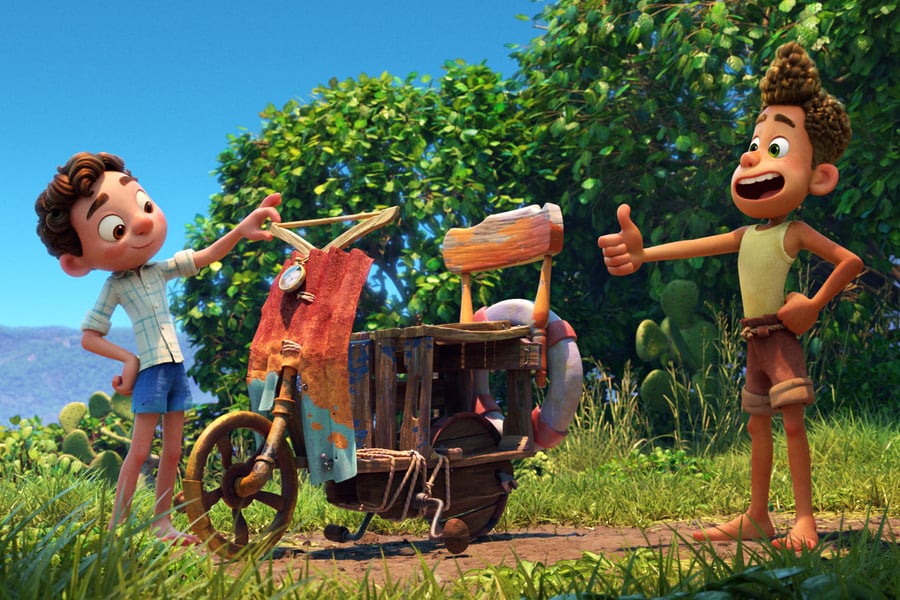“Minor Pixar” — a bit of a loaded phrase, right? The company that’s been responsible for giving animated movies several shoves up the evolutionary scale, and setting the bar for formal heights and emotional depth in ‘toon storytelling over the last quarter century, has created its share of masterpieces. (Pixar has also put out the Cars movies, a reminder that nobody is perfect and the concept of a just, merciful God is a myth.) In the spirit of something like a public service announcement, we’ll state upfront that Luca, the company’s latest endeavor, is not one of them. A Mondo Italiano Little Mermaid that embraces its 20th century Mediterranean archetypes with a that’s-ah-spicy-meat-ah-ball fervor, it does not have the oversized imagination of an Inside Out, the end-of-innocence heft of the Toy Story films, or the pathos and wit of a Finding Nemo. It’s a much more modest affair, a tale of friendship that’s a very personal project for filmmaker Enrico Casarosa, yet one that’s capable of resembling a summer afternoon lounging by the shoreline. That two-word appraisal up top? You will likely hear that a lot in regards to this updated fairy tale.
To dismiss this joyful celebration of youth, and yearning for knowledge beyond your reach, and the giddy thrill of riding a Vespa down cobblestone backstreets after gorging on homemade tagliatelle, simply because it’s a second-tier outing for the animation juggernaut would be a mistake. There’s a wistfulness embedded in the abundance of whimsy here — the same ache for something out of the past that you find at the center of all great Pixar movies — that thrums right beneath the bright, postcard-ready backgrounds and competing plotlines. And you don’t need to have grown up like Luca (Room‘s Jacob Tremblay), living under the eyes of his overly protective parents (voiced by Maya Rudolph and Jim Gaffigan, because of course they are!), to connect with that feeling of longing when it surfaces. You don’t need to have had a summer that changed your life, or met an older kid who mentored you, or suffered torment from a bully with the ripe moniker Ercole Visconti. You don’t even need to be a sea monster to relate.
Yes, Luca is a sea monster, part of a community of scaly fish-folk who live underwater right off the coast of an Italian fishing town. The land-dwellers have occasionally seen glimpses of these creatures swimming past their boats, and several carry harpoons with them should they encounter one face to face. Still, like his America cousin Ariel, Luca wants to be part of their world. He happens to notice one of his fellow young mermen swimming toward land one day … and then, suddenly, jumping out of the ocean and miraculously morphing into a human teen once he’s on dry land. Call him by his name: Alberto (Jack Dylan Grazer). Luca realizes that he too can pull a Pinocchio and turn into a real boy once he crosses the threshold. Even better, this big-brother surrogate is going to show the lad the ropes on how to be a Homo sapien, as well as the joy of riding homemade scooters down rickety hills and jumping off of cliffs. Soon, the duo head off to nearby Portorosso, in the hopes of winning a race that will allow them to realize Alberto’s dream: owning a real Vespa.
If you’re an animation fanatic, the name of this Cinque Terra-type town may bring to mind Hayao Mizayaki’s 1992 movie Porco Rosso, and even if you haven’t felt like you’ve been huffing Ponyo‘s fumes in some of the you-know-what-outta-water sequences, the shadow of Studio Ghibli hovers over Luca. (The boys’ wide-eyed, moon-faced sea monster versions could be dropped into any number of anime features and fit right in.) The mixture of the fantastic and the sublime that’s constitutes the Ghibli house tone is very much what Casarosa & co. aiming for, though the many, many bits of business onscreen suggests a homecooked meal of Disney/Pixar leftovers. There’s that race, and the bully, and a young woman named Giulia (Emma Berman) who inspires a love of learning in Luca, which will eventually cause his path and Alberto’s path to diverge. Luca’s parents take on a human form and search for their son. Sacha Baron Cohen has a cameo. Giulia’s dad is a one-armed fisherman who’s face is 90 percent bushy eyebrows and Tom-Selleck-on-steroids mustache; he’s the village’s No. 1 sea monster hunter, but being born without a limb makes him sympathetic to being different. Any exposure to water — via fountains, rain storms, morning dew — threatens to out the kids.
With so many of these elements colliding into each other, and so many pleas for tolerance and touristy shout-outs to the region jockeying for space, it’s easy for the movie to occasionally get tangled its in own macro- and micro-narrative nets. Yet when Luca gets back to that central relationship between these two boys-to-mermen, all of that peripheral stuff drops away. Allowed to concentrate on the moments shared between these two youngsters, and how their bond is destined to be fleeting, the film becomes singularly focused on the heart of this story and, as a result, quietly breaks yours. Its ephemeral charm and its growing-pain sorrow are finally allowed to shine through.
If you’ve seen Casarosa’s Oscar-nominated short La Luna, you know he’s capable of crafting storybook images designed to channel childlike wonder. There are a handful of those here as well, starting with a bruised Mediterranean dawn and climaxing in an affectionate portrait of various species breaking bread. Nothing compares, however, to the way he takes the oldest cliché in the romance-cinema book and gently, gracefully, effectively grafts it on Luca‘s climax. Suddenly, after 90 minutes of intermittent highs and déjà-vu lows, this Pixar movie takes a second to recognize this friendship for the transformative, bittersweet thing it was — and doesn’t feel minor whatsoever.
From Rolling Stone US






































